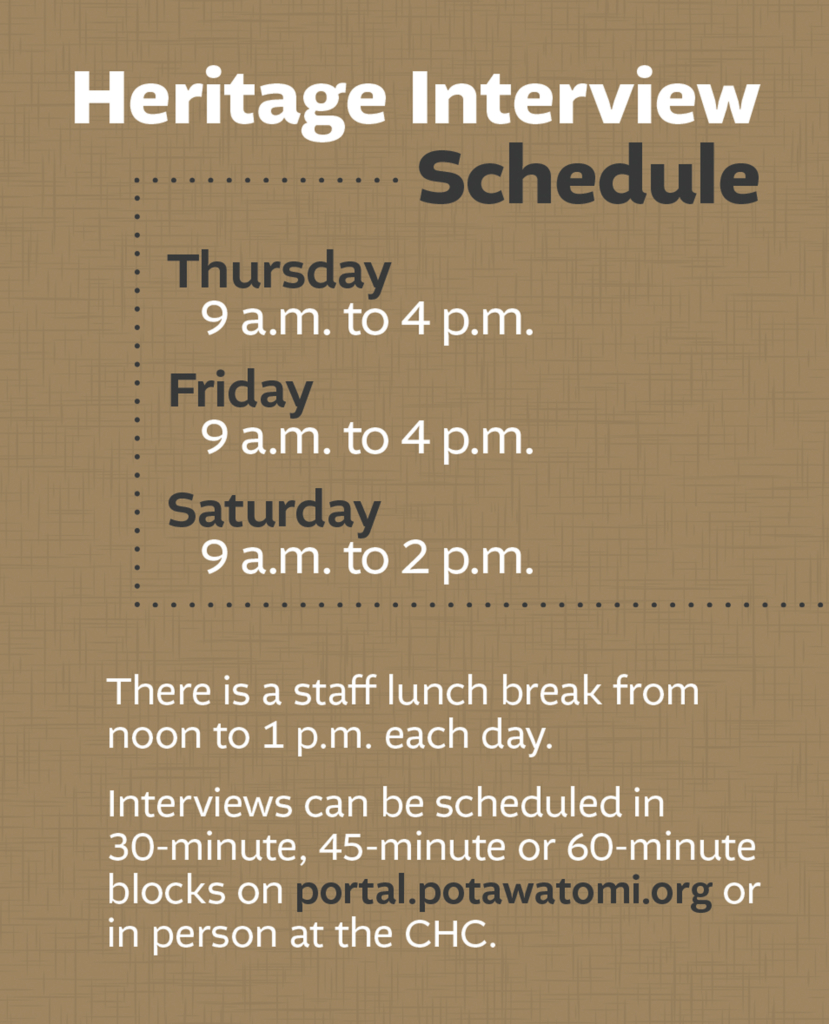Tribal Heritage Manager Christopher Lenggenhager with the Citizen Potawatomi Nation Cultural Heritage Center hopes to see many Tribal members during Family Reunion Festival this year. He aims to record interviews that serve as video time capsules for future generations.
Lenggenhager said he starts off the interview with basic questions such as the person’s name and age before transitioning to a discussion style that is more fluid to allow the interviewee to talk about whatever they feel they need to discuss.

Interviewees have taken many approaches. In one video, a mother and daughter sat down together. The mother had written down what she wanted to say and read from the paper. The daughter closed the interview by singing. In another, he asked a young girl to leave a message for her future self. In yet another, a young woman spoke about the experience of being new to learning about her Potawatomi heritage while her children played around her.
“There’s a lot of people who can relate to that,” Lenggenhager said. “Down the road, if they continue with it, it would be great to see where it began. The kids might look back and think, ‘This is the moment Mom decided.’”
He also said he tries to ask participants for thoughts they might want to pass down to their future self or to descendants.
“Not to put a lot of pressure on them, but just a basic thing,” he said. “’What have you picked up in your knowledge so far in life? What advice would you give a younger you?’ You’re talking to someone who may watch this video that you may not even know yet, but maybe a blood descendant of yours that may be 15 or 16 years old. What would you say to that person about your experience now?”
The interviews do not have to be full of historical or cultural insights — though they appreciate when they can capture those aspects. In essence, they hope to capture individuals and families sharing about themselves and their lives in their own words.
“The whole point is to make it conversational to make the person more comfortable,” he said, adding that the person being interviewed controls the content of the interview.
This also means those who are interviewed can put restrictions on the use of the interview, though that rarely happens, including not allowing it to be shown to the public, not allowing it to be shown to family, or even not allowing it to be shown for a certain timeframe.
Lenggenhager said the project has been around for many years. It originally focused on Tribal veterans and then on elders. Now, it is open to everyone. Tribal Chairman John “Rocky” Barrett expressed a wish to get every Tribal member on camera at some point.
“We literally have hundreds of videos, but not nearly enough,” Lenggenhager said. “We have less than 1 percent of our Tribe. We’d appreciate more participation.”
Lenggenhager said he often thinks of his own Tribal heritage and how much he would have loved to have an interview with his grandmother that he could share with his grandchildren to pass down her stories.
“I didn’t get that opportunity. But if I can capture that for someone else, how awesome that would be,” he said.
Lenggenhager thinks the videos are made for people 100 or 150 years from now, not for those filming them today.
“The main message I want to convey to people is that they may not realize the importance of it now, but it will be very important to somebody later,” he said. “And it doesn’t matter what you have to say. If you’re willing to just sit for a minute to talk about anything, you’re passing on something invaluable to your descendants. Long after you’re gone, people will be able to hear your stories, your words, from your mouth. And that’s invaluable.”
Interviews can be scheduled during Family Reunion Festival from 9 a.m. to 4 p.m. Thursday and Friday and from 9 a.m. to 2 p.m. Saturday. Staff lunch breaks are scheduled daily from noon to 1 p.m. Interviews can be scheduled in time slots of 30, 45 or 60 minutes.
To schedule an interview, visit the Ancestors portal (portal.potawatomi.org) to register and select a time.
